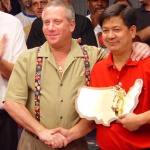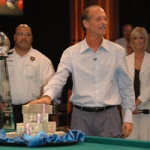The Big Time
It’s been 10 years since the International Pool Tour died. How will history judge the short-lived $13 million venture that showed the promise and peril of attempting to bring pool into the big time?
By Nick Leider
It almost seems like a fever dream, now that it’s been a decade since its death. The International Pool Tour, founded and funded by infomercial maven Kevin Trudeau, held four events in 14 months that awarded more than $6 million in prizes. Pool had not seen — and most likely will not see — anything like this in the history of the sport.
Efren Reyes, winner of two tournaments, pocketed $765,000. The matches were live broadcast across Europe in primetime. Players were told of guaranteed income in the six figures.
But now, 10 years after the IPT’s final event, the World Open, left players with little more than IOUs for $3 million, Billiards Digest revisits the IPT’s unbelievable rise and equally astonishing fall. While setting the record straight on what remains one of the most controversial eras in modern pool, one question begs for an answer:
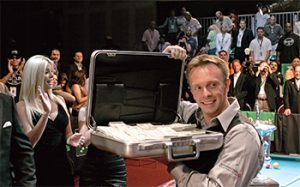
Though short-lived, the IPT still showered pros like Thorsten Hohmann with briefcases full of cash.
What was the IPT’s lasting effect on the game we love?
The Facts
Before telling the story of the IPT, it’s imperative to present the facts that are often lost in the legend of the IPT.
First, every player who won money received what they were due. The $3 million in prizes from the World Open, the abbreviated tour’s last stop, were awarded, though it took 14 months and a series of installments to meet the tour’s obligations.
Second, players did lose $2,000 paid to play in qualifying events for a tournament that never happened. The IPT postponed and then cancelled its future events, leaving those who had ponied up that qualifier money without recourse.
“Some players received that money back and others did not,” said Deno Andrews, the IPT tour director who handled day-to-day operations. “I can’t remember how many ended up losing that money. It was not that many players — with that said, any [number] more than zero was too large.”
Finally, among the top players who competed on IPT, the consensus was that, despite the missteps, broken promises and eventual failure, it was a good thing while it lasted.
“My brothers on tour, we were all really happy about Trudeau and the IPT,” said Rodney Morris, who earned $150,000 with a runner-up finish at that maligned World Open. “We made some money and we had a great time. We were more than happy to be a part of it. We wished things would’ve worked out, but I have nothing against anyone.”
Thorsten Hohmann, who netted $350,000 by winning the North American Open, agrees.
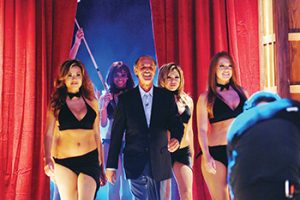
Trudeau’s events were lavish affairs, brimming with pomp and circumstance, as showcased in the Battle of the Sexes match between Loree Jon Hasson and Mike Sigel.
Still, the IPT, coming on so strong and crashing so quickly, affected much more than players’ bank accounts. To see these impacts, it’s worth starting at the beginning.
The First Time
The World Championship Open (Aug. 20, 2005)
Trudeau’s entry into professional sports was a moment of serendipity for pool, a bit of luck for a sport that desperately needed it. The women’s game, buoyed largely by the WPBA Classic Tour, was in decent shape, with events regularly appearing on ESPN and top players able to support themselves with tournament winnings. The men’s side, though, had little as far as organization. The Professional Billiards Tour Association had collapsed in the decade prior. Outside of a few big world championship tilts and the annual U.S. Open 9-Ball Championship, organization was minimal and cooperation was almost nonexistent.
The seeds of the IPT, though, were planted a decade earlier in 1994. Trudeau was already a successful businessman, but he was not yet riding what would be a wave of commercial success based largely on his “Natural Cures” brand, including a New York Times bestselling book and ubiquitous late-night infomercials. Long a fan of pool, he caught a radio advertisement for an exhibition in the Chicago area featuring Hall of Famer Mike Sigel.
“Kevin got in touch with me saying he wanted personal lessons,” Sigel said. “We became friends and I would see him every few weeks. And then I got it in my mind. I said, ‘Hey, you got all this money and you love pool. Let’s do something for the game.’
“I nagged him for 10 years, saying we should do something together. Finally, one day when we were playing pool, he said, ‘Let’s do it.’”
The two scribbled down some notes about prize money. Sigel imagined top prizes around $100,000, with other top finishers pocketing proportionally big bucks. Trudeau, though, had bigger ideas from the start.
“He looked at all that, without even adding it up,” Sigel said, “and he said it’s got to be bigger. For him, from the start, it wasn’t a matter of doing something. It was a matter of how big it was going to be.”
Eventually, the plan was to hold a kickoff challenge match in August 2005 between Sigel and fellow Hall of Famer Loree Jon Jones in Las Vegas. Dubbed the World 8-Ball Championship, the battle of the sexes paid the winner $150,000 with a consolation prize of $75,000. Trudeau threw a lavish party the night before the event, replete with celebrities. On the day of the Sigel-Jones match, the celebrities (actors Paul Sorvino, Allison Janney and Anthony Anderson, rapper DMX and boxing legend Thomas Hearns among them) entered the arena in true red carpet style.
Deno Andrews was taken with Trudeau’s insistence on this being like nothing pool had seen before.
“Everything had to be big. We did nothing half-assed,” Andrews said. “What gets him going is entirely different than what gets the rest of us out of bed. He wanted it big and he wanted it immediately.”
By August, the IPT had crash-landed on the pool world.
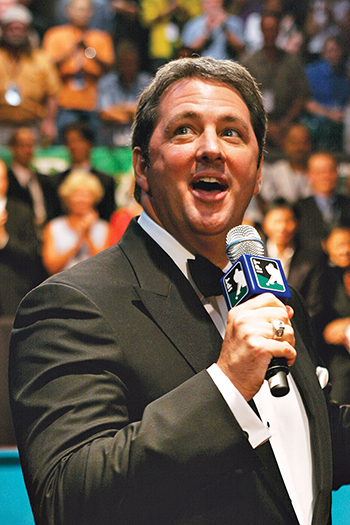
With media maven Trudeau at the helm, “everything had to be big.”
If a guy wanted to get pool players’ attention, big money and bright lights aren’t the worst ways to do so.
The Best of Times
The King of the Hill 8-Ball Shootout (Nov. 30-Dec.4, 2005)
The North American 8-Ball Championship (July 22-30, 2006)
The IPT initially started with 150 players hand selected by Trudeau and the IPT brass. Potential tour members had to apply for a spot on this lucky list, which may be the first and only time pool players put together resumes en masse.
A group of players automatically qualified based on past performance. Think Johnny Archer, Efren Reyes, Rodney Morris and other world-class talents. A dozen living Billiard Congress of America Hall of Famers received automatic entry and a $30,000 bonus simply for being part of the tour. Other players had to apply to tour membership. Darren Appleton, then a professional English 8-ball player but largely unknown in the U.S., emailed his application to the tour hoping that his unmatched record in a slightly different discipline would earn him a spot. (It did.)
The King of the Hill event, however, would only see 42 players compete for the $1 million prize fund, with $200,000 going to the winner. Still, the IPT managed to get all 150 players to Orlando for the event, because a mandatory players meeting promised to detail just what the tour had in store for its first year.
“It was the greatest speech I’ve ever heard,” said Thorsten Hohmann, of Trudeau’s pitch to the players. “It was incredible. I wasn’t really too aware of everything until I got to Orlando and heard Kevin. That made me realize: Holy shit. This is something big.”
Appleton, whose involvement with the tour led to him ditching English 8-ball for the American variety, was equally blown away.
“That players meeting, [there] was amazing excitement. I felt like a professional sportsman,” he said. “This was the biggest thing to happen for pool.”
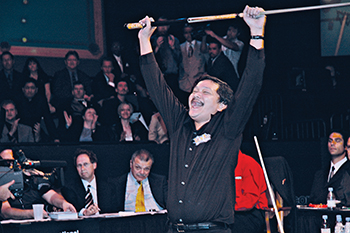
Reyes scored pool’s biggest ever prize.
Six months later, the North American Open brought 200 players to the Venetian in Las Vegas for a chance at the $2 million purse. The top prize was $350,000, the biggest single payday in the history of pool. EuroSport was broadcasting the event live in primetime. Deals were made with Outdoor Living Network to replay the matches for North American audiences. Before a ball was struck, this event was the most significant tournament in years.
The grueling round-robin, multi-round format had players playing four or five race-to-8 sets a day, often clocking more than 12 hours at the table. Hohmann eventually prevailed over Filipino snooker convert Marlon Manalo. But what happened on the table took a backseat to the event itself. The bright lights, the professional production, the class of such an event seemed to mark pool’s arrival as a legitimate sport.
But just two months later, at the IPT’s fourth event, the wheels fell off what everyone thought was pool’s gravy train.
The Worst of Times
The World 8-Ball Championship (Sept. 3-9, 2006)
The World 8-Ball Championship began with Trudeau announcing the cancellation of a scheduled event in London, which had some of the 200 players nervous about what was to come. Regardless, the $3 million prize fund went a long way to relieving any anxiety among the players.
The grueling tournament schedule, again having players compete nearly nonstop for days at a time, left Rodney Morris facing Efren Reyes for the $500,000 top prize. The on-table action ended with the Filipino legend pocketing the top prize while Morris “settled” for $150,000.
Or so it seemed.
All the players left the Grand Sierra Resort and Casino in Reno, Nev., with nothing. Players walked away with promises of future payments, but concerns that were raised at the players meeting became very real for those with a stake in the game.
“That Sunday, Kevin came to me and said the money wasn’t in the bank,” Andrews said. “I’ll never defend him not paying the players. That was wrong and it will go down in history as wrong. But I told him, 100 percent, he needs to pay the players and he said he would.”
Rumors circulated about a proposed deal with Stanley Ho, a billionaire casino magnate based in Hong Kong, to buy the tour. The supposed windfall from this would have supported the tour’s future, Trudeau insisted. But an agreement never materialized. Also, on Oct. 13, 2006, President George W. Bush signed into law the Unlawful Internet Gambling Enforcement Act, which outlawed wagering over the Internet for individuals in the U.S. This, according to the IPT, impacted the tour’s ability to market itself to potential buyers.
Over the course of 14 months, in nine installments of 11 percent, the payments arrived. All the while, no further tournaments were scheduled. The IPT staff, once more than 20 people, was slashed to a skeleton crew of five. Unable to produce profits through events, Andrews pivoted to reducing costs and raising what revenue he could through streaming recorded matches online, selling DVDs and collecting TV and product royalties.
The money wasn’t flooding in, but it was substantial enough to cover roughly half the amount owed to players, according to Andrews, with Trudeau covering the remainder.
“He could’ve filed for bankruptcy,” Andrews said. “He could’ve stiffed the players, but two months after that tournament, I did everything I could to persuade him to commit to paying the players.”
While the payments trickled out, the IPT held seven challenge matches, one-on-one events that were streamed online. The response was tepid and a steep decline from the glitz and glamor of the major tournaments that preceded them. The tour continued on in a sense, but it was evident to everyone within the sport that the IPT of 2007 was a far cry from what the tour had been just months before.
With the future of the IPT falling well short of expectations, Sigel took issue with players who quickly lost faith in the IPT.
“When players started knocking [Trudeau], I couldn’t believe it. That has to leave a bad taste in your mouth,” he said. “That’s when I thought, if it was me, I wouldn’t pay them and just go bankrupt. But he paid him. That’s the kind of guy he was.”
Andrews, however, puts blame on those around the game.
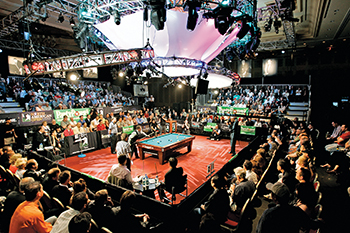
No expense was spared in the production of IPT events, including a sparkling arena to dazzle the masses.
Regardless of where blame lies, those who had the most to gain from the IPT adventure felt a real sense of loss once it was clear things weren’t going to turn out as advertised.
“I had a chance to win $500,000 and then I had to go try to win $10,000?” Morris said. “I lost a lot of motivation. I did a lot of soul searching at that time. For about a year there, I didn’t know what I was going to do. I was depressed for a while.
“It was real hard. I didn’t want to play at all. For a year, I was in a coma. I could’ve been on the “Walking Dead” — just walking around without an idea.”
Hohmann, another player who had profited immensely from the IPT’s short run, expressed similar feelings.
“It wasn’t like the tour ended at once,” he said. “It was a bit of a slow death — them dragging it out with exhibition matches. Of course I fell into a slump … It took me a few years to recover from that. You have these high expectations and then you’re back to playing in tournaments where you’re walking away with $2,000. It was hard.”
The End of Times
Once the players had been paid in full, Andrews met with Trudeau to discuss the IPT. More than $13 million had been invested, including prize money, production costs and marketing. The operation, already stripped to its bare minimum, was barely paying for itself.
The IPT, as it had been packaged from the beginning, was all but dead and buried. At that point, pool’s golden goose decided to pull the plug.
The slow death, as Hohmann put it, had come. But now, in 2016 and a decade after the cash was stacked on the pool table at the first event, the question still remains: Was the IPT a net positive or negative for pool?
“It was good,” Sigel said. “To this day, I defend the IPT whenever I hear someone talk about it. Add up all the money in the years before and after and it won’t come close to the $13 million Kevin put into the game.”
Sigel, who first hatched the concept of the IPT, agrees with Andrews, who was involved in the execution of that idea.
“Ultimately, it was good,” Andrews said. “If you remember what it was like before the IPT, it was very similar to what it is now. It was exactly like it is today … We created an entirely alternate universe for pool. It happened in a vacuum and ultimately I don’t think it had much of an effect on pool. It didn’t impact the actual state of the sport today.”
“He invested an amazing amount of money and it was great,” Appleton said. “I started playing American pool because of the IPT. I have that time to thank for my career and everything I’ve achieved since then.”
“Pool players can be some of the most loyal, trusting and straightforward people,” Andrews said, who continued to work with Trudeau until 2013. “Really the promoters are goofier than the players. The players show up, they pay their expenses, they pay the entry fees, they practice. They do all this stuff, and it’s such a basic thing: Pay them on time.
“I still hear about this. The money isn’t there or the added money was different than what was published … We were as guilty as anybody, but the players were overwhelmingly supportive.”
Big Changes at IPT: Tour to Be Sold, London Event Cancelled
The future of the fledgling, multimillion-dollar International Pool Tour was cast in a new light on Saturday by the surprising news that tour founder Kevin Trudeau had entered into an agreement to sell the tour, and that the IPT Players 8-Ball Championship, scheduled for Oct. 22-29, had been cancelled.
Both announcements came during the players’ meeting Saturday for the IPT’s World 8-Ball Open Championship, set for Sept. 3-10 at the Grand Sierra Resort and Casino in Reno, Nev.
According to an IPT release, the IPT has agreed to a purchase by Ho Interactive, a new company started by casino owner billionaire Stanley Ho, who also owns online gambling site www.hocasino.com. IPT founder Trudeau told the crowd of 200 players that Ho Interactive will be taken public on the London exchange at some point in the near future.
The 84-year-old Ho is worth $6.5 billion, according to Forbes magazine’s 2006 list of the richest people in the world. The Hong Kong-based Ho controls virtually all casinos and gaming in Macau, a small Chinese territory off China’s southern coast.
Little was immediately known about the sale, or how it will affect the IPT’s plans for a 2007 season. BD will release new information as it becomes available.
The players also were informed that the London-based Players Championship was cancelled, due to problems in negotiations with The Excel, the intended host facility.
IPT Director Deno Andrews had told BD in the days leading up to the World 8-Ball Open event that cancellation of the event was a possibility, due to several reasons. They included the fear among some players of a terrorist attack, sparked by recent terrorist arrests in the U.K.; the trouble several international players were encountering obtaining visas for the U.K.; and conflicts in the programming schedule of EuroSport, the broadcast network that had planned to air some of the IPT matches live.
“At every juncture, we’ve had a problem with the London tournament,” Andrews told BD on Aug. 25.
Three more events are set on the IPT’s 2006 schedule: the Masters 8-Ball Championship, Nov. 26-Dec. 3 in Chicago; the King of the Hill Invitational 8-Ball Shootout, Dec. 12-17 in Las Vegas; and a simultaneous 2007 qualifying event, also set for Dec. 12-17 in Las Vegas.
At the players’ meeting, IPT members were promised a minimum of $13,000 for the 2006 season for every player who played in all the 2006 tournaments. Those whose total winnings were short of the figure would be written a check for the difference.
Buddy Hall Makes Way For Understudy in IPT’s First Event
The International Pool Tour announced today that Hall-of-Famer Buddy Hall has withdrawn from the IPT North American 8-Ball Open Championship to be held July 27-30 at The Venetian-Las Vegas. Hall expressed regret for his withdrawal, citing personal reasons: “At this time, I will not physically be able to play the length of time needed to be competitive at the Venetian. I am getting better everyday, and I am very thankful for the IPT, and looking forward to my return at the next tournament!”
Hungarian Vilmos Foldes was chosen to fill Mr. Hall’s vacancy due to his two third-place finishes in the 2006 IPT Tour Card qualifying tournaments. Foldes will have the opportunity to earn points toward attaining a 2007 IPT Tour Card and was thrilled by the news. “I have dreamed of this day for pool and for me. I am very happy to be invited by Kevin [Trudeau] and Deno [Andrews]. I now will tell my father the good news,” he said.
Hall anticipates he’ll be ready to play by the next event, the IPT World 8-Ball Open Championship, which will be held Sept. 2-10 at the Hilton in Reno, Nevada.
The North American Open will consist of 200 players: 150 IPT Members and 50 players who qualify through 25 qualification events throughout North America and abroad. Qualification Tournament details for open tournaments, including dates and locations are listed on www.internationalpooltour.com.
IPT Holds Press Conference in London Relating to International Television Deals
International Pool Tour founder Kevin Trudeau, along with IPT Executive Director Jon Denny and IPT Tour Director Deno Andrews, is expected to make several major announcements about the global television deals that have been signed by the tour, including unprecedented live coverage of all 2006 events.
The event, held today at the Hard Rock Café in central London, is being called the biggest press conference in the history of pool, with dozens of representatives of major U.K. and European newspapers, magazines and television networks expected to attend.
Top IPT European players are scheduled to attend the media event, including Ronnie O’Sullivan and Raj Hundal of the U.K., Neils Feijin and Nick Van Den Berg of the Netherlands, France’s Vincent Facquet and Gerda Hofstatter, originally from Austria.
Stay tuned to Headstring News for any breaking news items that result from the press conference.
IPT Announces the Lucky 150
Marketing maven Kevin Trudeau’s new International Pool Tour has announced the 150 players who were accepted for membership in the IPT for its first regular tournament season, which kicks off with the IPT Masters’ 8-Ball Championship, January 31-February 4, 2006, at the Orlando Convention Center in Orlando, Fla. The advertised prize money for that event is an unprecedented $1 Million, with a first prize of $200,000. Only those players on the 150-person IPT membership list are eligible to enter the tour’s regular tournaments, though there are open events planned that will not have that requirement.
All events are to be 8-ball, on slow-nap cloth with 4 1/2-inch pockets. Jump cues and breaking from the side rail is prohibited, and the format is round-robin with the exception of the final match.
The IPT’s Web site, www.internationalpooltour.com, notes that, now that the 150 have been announced, it is no longer accepting applications for regular tour players.
At the end of 2006, the bottom 50 money earners on the tour will lose their tour card. An open qualifying tournament will be held to determine who gets those 50 spots for the 2007 season.
Here is the complete 2006 IPT membership list:
2006 IPT Players (Last, First – Country)
Adkins, Dee – USA
Alvarez, Frank – USA
Amine, Ouahbi – France
Amir, Ibrahim bin – Malaysia
Appleton, Darren – UK
Archer, Johnny – USA
Bartram, Chris – USA
Basavich, Daniel – USA
Beaufils, Yannick – France
Blyzes, Brian – USA
Brienza, Paul – USA
Broadhurst, Jackie – USA
Bryant, Charles – USA
Bustamante, Francisco – Phillippines
Butera, Lou – USA
Butera, Sal – USA
Calderon, Jerry – Venezuela
Carte,r Linda – USA
Carvajal, Alejandro – Chile
Catledge, Wayne – USA
Cemero, Michael – USA
Chamat, Marcus – Sweden
Chenman, Lee – China/Hong Kong
Chohan, Tony – USA
Colenso, Colin – China
Corr, Karen – USA
Coutts, Glen – New Zealand
Crane, Wade – USA
Czetli, Aaron – USA
Daulton, Shannon – USA
Davenport, Kim – USA
Davis, Mike – USA
Deuel, Corey – USA
Di Liberto, Dany – USA
Di Toro, John – USA
Dodson, Robin – USA
Dominguez, Ernesto – USA
Eberle, Max – USA
Eckert, Ralph – Germany
Edey, Tyler – Canada
Ellerby, Sarah – USA
Facquet, Vincent – France
Feijen, Niels – The Netherlands
Fisher, Allison – USA
Fisher, Kelly – USA
Frank, Troy – USA
Franken, Aaron – Aruba
Friend, Bernie – USA
Fusco, Jimmy – USA
Fusco, Pete – USA
Gay, Leil – USA
Goh, Tuan Kiat – Singapore
Gonzalez, Rafael – Venezuela
Gulyassy, Mike – USA
Hall, Buddy – USA
Hann, Quinten – Australia
Harrison, Philip – England
Hatch, Dennis – USA
Hill, Mick – UK
Hofstatter, Gerda – USA
Hohmann, Thorsten – Germany
Holtz, Patrick – UK-Scotland
Hopkins, Allen – USA
Hundal, Raj – United Kingdom
Hunter, Bobby – USA
Immonen, Mika – USA
Incardona, William – USA
Jahnke, Bernd – Germany
Jakulj, Zlatko – Croatia
Jones, Loree Jon – USA
Jones, Sammy – USA
Jones, Tammy – USA
Jones, Jeremy – USA
Juva, Markus – Finland
Kelly, Ed "Champagne" – USA
Kennedy, Thomas – USA
Kenniston, Mary – USA
Klasovic, Andreja – Serbia/Montenegro
Kutcher, John – USA
Laurance, Ewa – USA
LeBron, Mike – USA
Lely, Alex – The Netherlands
Leonardo, Gunnar – Aruba
Lin Sheng – Young Taiwan
Lipsky, Steve – USA
Lohtander, Marko – Finland
Macias, John – USA
Manabu, Mori – Japan
Manalo, Marlon – Phillipines
Martin, Ray – USA
Massey, Mike – USA
Mathews, Grady – USA
McCready, Keith – USA
Mckenna, Robert – United Kingdom
Minici, Joe – Australia
Montal, Edwin – Canada
Morris, Carl – UK
Morris, Rodney – USA
Murphy, Austin – USA
O’Sullivan, Ronnie – UK
Owen, Gabe – USA
Parica, Jose – Phillipines
Petroni, Fabio – Italy
Potier, Paul – Canada
Putnam, Shawn – USA
Putnik, Ivica – Croatia
Raney, Jim – USA
Raybone, Neil – UK
Reljic, David – Australia
Rempe, Jim – USA
Reyes, Efren – Phillipines
Roberts, James – USA
Robles, Tony – USA
Runnels, Ike – USA
Sabtu, Suhana Dewi – Malaysia
Sakai, Miyuki – Japan
Saleh, Brian – UK
Salvas, Luc – Canada
Sambajon, Santos – Phillipines
San, Souci George "Ginky" – USA
Santl, Stefan – Germany
Schmidt, John – USA
Schwartz, Larry – USA
Sigel, Mike – USA
Soquet, Ralf – Germany
Stalev, Evgeny – Russia
Storm, Tom – Sweden
Strickland, Earl – USA
Thornfeldt, Helena – USA
Thung, Denny – Indonesia
Tourangeau, Stan – Canada
Townsend, Scotty – USA
Travers, Laurent – France
Van den Berg, Nick – The Netherlands
Varner, Nick – USA
Vickery, Howard – USA
Watson, Gerry – Canada
Webb, Monica – USA
West, Dallas – USA
Wetch, Jimmy – USA
Wheeler, Adam – USA
White, Jimmy – UK
Williams, Charlie – USA
Wims, John – Australia
Yee, Kwan Suet – Malaysia
Younger, Johl – Australia
Yuen, Ooi Fook – Malaysia
Zimmerman, Michael – USA
Jones No Match For Sigel
Presented with bundles of cash that totaled a highest-ever $150,000 top prize, Sigel tried to put the moment into words. The only thing that came out, however, were tears.
“Six weeks of practice, and all the hype, and what this means for pool, it was too much,” said Sigel of the much-anticipated “battle of the sexes” head-to-head match.
Jones, who admittedly was no match for her own nerves, still received a tidy $75,000 paycheck for the afternoon’s work.
The Sigel-Jones match will serve as the launching pad for bigger and more elaborate events for pro pool in the future, according to entrepreneur/promoter Kevin Trudeau.
“Just think,” Trudeau said after the match. “Mike Sigel just earned the biggest single payday in the history of the sport, and it will be the smallest first prize in IPT events!”
As expected, both players were shaky at the start of the match, played in an elaborate arena setting and witnessed by 500-plus fans, including numerous sports and entertainment celebrities. Jones missed several chances to put pressure on Sigel, who rolled off from a 3-2 lead to a 9-2 first-set win. In the second set, a relaxed Sigel played more to expectations, while Jones again missed several critical shots.
“BD Live Chat” Tonight with Kevin Trudeau
Who is the man behind this weekend’s $225,000 Battle of the Legends match between hall of famers Mike Sigel and Loree Jon Jones?
It’s millionaire entrepreneur Kevin Trudeau … the informercial pioneer and author of The New York Times bestseller, “Natural Cures.” And Trudeau’s grand plan for pool extends well beyond Saturday’s marquee match-up at Mandalay Bay in Las Vegas. Trudeau’s International Pool Tour is the buzz of the pool world.
Tonight at 8:00 p.m. EST, Trudeau will be live on “BD Live Chat,” answering YOUR questions about Saturday’s big match, the IPT, his formula for bringing pool into the big time, and why 8-ball is pool’s future.
The BD Live Chat room will open at 7:30 p.m. EST to give users an opportunity to begin posting questions.
Loree Jon Jones LIVE Chat Tonight!
Tonight’s your chance to chat with Loree Jon Jones!
Just click the red button above! In advance of their epic $225,000 face-off in Las Vegas, Aug. 20, Loree Jon Jones and Mike Sigel, as well as promoter Kevin Trudeau, will share their thoughts on the Battle of the Legends showdown LIVE on BilliardsDigest.com this week.
BilliardsDigest.com will feature live chats on three separate nights leading up to the mega-match. Eight-time world champion and Billiard Congress of America Hall of Famer Jones will offer her views and answer questions from site visitors TONIGHT, (Aug. 16th) at 8pm EST.
Sigel will be online tomorrow (Wednesday Aug. 17) at 8pm EST, and Kevin Trudeau will answer questions this Thursday (Aug. 18) at 8pm EST.
Each night visitors can log on at 7:30 EST and begin submitting questions for that night’s visitor. The red button (above) on the BD home page will direct visitors to the BD Live Chat page.
Sigel, LJ Ready To Lay Down Some Smack!
Bring on the Hype! In advance of their epic $225,000 face-off in Las Vegas, Aug. 20, Loree Jon Jones and Mike Sigel, as well as promoter Kevin Trudeau, will share their thoughts on the Battle of the Legends showdown LIVE on BilliardsDigest.com next week.
BilliardsDigest.com will feature live chats on three separate nights leading up to the mega-match. Eight-time world champion and Billiard Congress of America Hall of Famer Jones will offer her views and answer questions from site visitors on Tuesday (8pm EST). Sigel, nine times world champion and also a BCA Hall of Famer, will surely bring his A game to the BD site on Wednesday (8pm EST). And Kevin Trudeau will talk about his involvement in pool and his grand plans for the International Pool Tour on Thursday (8pm EST).
Each night visitors can log on at 7:30 EST and begin submitting questions for that night’s visitor. A button on the BD home page will direct visitors to the BD Live Chat page.
Let’s get ready to rumble!

